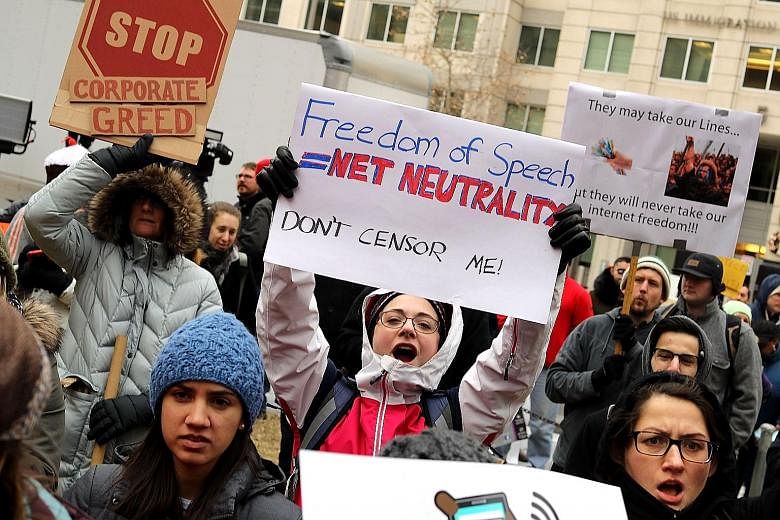WASHINGTON • The vote by the US Federal Communications Commission (FCC) to repeal its Net neutrality rules marked the end of a brief experiment by the network regulator to rein in the huge power of Internet providers by treating them like the highly regulated telecoms.
Now, providers will be allowed to speed up some websites - and block or slow down others - so long as they disclose it to the public, and violations will largely be handled after the fact by the Federal Trade Commission, not the FCC.
But far from settling the matter, the Republican-led FCC has simply opened a new chapter in a bruising Washington battle
"For the last decade, we've been on a regulatory roller coaster," said lawyer Jack Nadler, who blames a chronic case of Net neutrality whiplash on Washington's "recurring bureaucratic convulsions".
That dynamic threatened to play out once more last week as the FCC voted on Thursday to dismantle the Obama-era network rules put into place just two years ago. Supporters of the regulations have vowed to sue the FCC in an effort to stop it.
"We will fight the FCC's decisions in the courts, and we will fight it in... Congress," said Senator Ed Markey who, along with more than a dozen other lawmakers, promised to introduce legislation to overturn the FCC vote. And New York's Attorney-General Eric Schneiderman said he intends to file a multi-state lawsuit against the FCC.
Meanwhile, California and Washington state lawmakers said they will try to write their own legislation to replace the federal rules - though that effort could be swiftly quashed. The FCC's decision explicitly sought to pre-empt states from going around federal rules, and agency officials made clear they would act against such attempts.
The zig-zag approach to Net neutrality is a by-product of the fact that the FCC's levers over industry change hands every time a new party takes the White House. In an era of extreme polarisation, that has led to Republicans and Democrats trying to overturn each other's policies at every chance.
A legal battle could drag on for months, if not years, analysts say, adding to a saga that has put powerful Washington lobbyists and sophisticated lawyers at each other's throats over the future of the Web since well before the rise of services such as Uber or Netflix streaming.
Under president George W. Bush, the FCC concluded that all consumers deserved to enjoy four fundamental freedoms online - the freedom to access any Web content of their choice, so long as it was legal; the freedom to use any online application; the freedom to use their home broadband connections on any device; and the freedom to get subscription information from their own providers.
But those provisions were non-binding.
That changed in 2010, when the FCC approved its first-ever Net neutrality rules. But these were soon challenged by Verizon, which argued that the FCC had overstepped the authority given to it by Congress. After three years of litigation, a federal appeals court finally sided against the FCC in 2014. The court said the FCC had tried to regulate Internet providers in the same way that it regulates traditional telecom companies, but without first identifying broadband as a telecommunications service.
The FCC approved new rules in 2015 that took the extraordinary step of classifying Internet providers as telecom providers, before imposing some of the same bans on blocking and slowing as it had before.
Broadband firms vocally opposed the decision, as it opened the door to further regulation, including the possibility of government price controls. But advocates hailed the new rules as a significant consumer protection against the rising power of broadband companies which could determine what sites Americans may effectively access as more of their daily lives moved online.
An industry coalition sued the Democratic-led FCC, leading to yet another court battle. This time, the agency won handily.
But then came President Donald Trump, and along with him, Republican control of the FCC. GOP officials felt they had been railroaded by Democrats on Net neutrality.
That effort culminated in Thursday's vote, with broadband companies again emerging on top and tech companies on the defensive.
WASHINGTON POST

